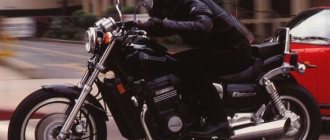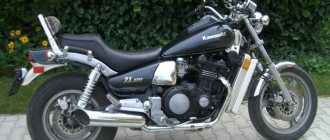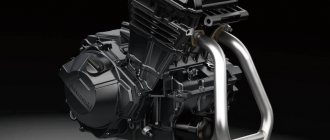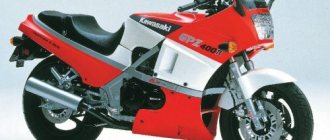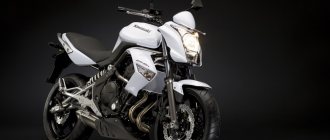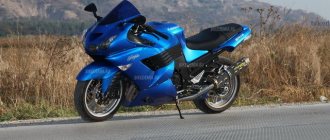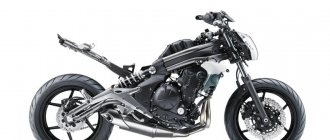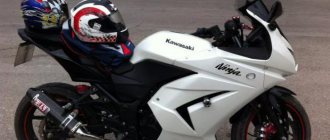The Kawasaki ZL 1000 Eliminator is identical to the ZL 400 in everything except its engine. The latter, although deformed, belongs to the sports category. The rest is classic, including the fit. Here is a sports cruiser that is suitable for people no taller than average.
The bike has a number of advantages, and its small size can be attributed to them to some extent. The Kawasaki ZL 600 Eliminator motorcycle, maneuverable at high speeds, is capable of overcoming obstacles due to its fairly large traction and is generally very strong, although it is difficult to tell by looking at it.
Engine
The four-stroke engine is of the in-line type. This engine is not simple, it was borrowed from a sports motorcycle of the same concern - Kawasaki GPZ 600.
The engine shows excellent results: peak torque is 46 Newton meters, while maximum power exceeds 60 horsepower.
The RPM at which this beast reaches its full potential is 7,000 rpm. Acceleration is truly impressive: in just 3.5 seconds the motorcycle can accelerate to 100 kilometers per hour. And this makes it, in a sense, a competitor to such a monster as the Honda VTX 1800.
The maximum speed of this Kawasaki is approximately 180 kilometers per hour.
Specifications
Technical characteristics of Kawasaki ZL600 Eliminator:
| Model | Kawasaki ZL600 Eliminator |
| Motorcycle type | power cruiser (dragster) |
| Year of issue | 1986-1987 (ZL600-A); 1995-1997 (ZL600-B) |
| Frame | steel duplex |
| engine's type | 4-cylinder, 4-stroke, in-line |
| Working volume | 592 cm³ |
| Bore/Stroke | 60.0 x 52.4 mm |
| Compression ratio | 11.0:1 |
| Cooling | liquid |
| Number of valves per cylinder | DOHC chain drive, 4 valves per cylinder |
| Fuel supply system | Carburetor, 4x Keihin CVK30 |
| Ignition type | transistor |
| Maximum power | 74.0 hp (54.4 kW) at 10,500 rpm – ZL600A 58.0 hp (42.7 kW) at 7500 rpm – ZL600A (Switzerland) |
| Maximum torque | 53.9 Nm (5.5 kg*m) at 8500 rpm – ZL600A 54.9 Nm (5.6 kg*m) at 7000 rpm – ZL600A (Switzerland) |
| Clutch | Multi-disc in oil bath, cable drive |
| Transmission | 6-speed |
| type of drive | cardan |
| Front tire size | 100/90-18 (56H) |
| Rear tire size | 150/80-15 (70H) |
| Front brakes | 1 disc, 280 mm, 1-piston caliper – ZL600A 1 disc, 300 mm, 2-piston caliper – ZL600B |
| Rear brakes | drum |
| Front suspension | 37mm KYB telescopic fork (pneumatic), 145mm travel – ZL600A 37mm telescopic fork, 150mm travel – ZL600B |
| Rear suspension | pendulum with two shock absorbers (pneumatic, adjustable preload and rebound), stroke - 108 mm - ZL600A pendulum with two shock absorbers (5-stage adjustable preload), stroke - 100 mm - ZL600B |
| Motorcycle length | 2240 mm – ZL600A (Europe) 2210 mm – ZL600A (North America) 2230 mm – ZL600B |
| Motorcycle width | 795 mm – ZL600A (Europe) 775 mm – ZL600A (North America) 720 mm – ZL600B |
| Motorcycle height | 1065 mm – ZL600A (Europe) 1120 mm – ZL600A (North America) 1090 mm – ZL600B |
| Wheelbase | 1550 mm |
| Seat height | 720 mm – ZL600A 715 mm – ZL600B |
| Minimum ground clearance (clearance) | 145 mm |
| Acceleration 0-100 km/h (0-60 mph) | 3.83 sec[1] |
| Maximum speed | 183 km/h[2] |
| Gas tank capacity | 12.3 l – ZL600A 13.0 l – ZL600B |
| Motorcycle weight (dry) | 195 kg – ZL600A 197 kg – ZL600B |
| Motorcycle weight (curb) | 211 kg – ZL600A 213 kg – ZL600B |
Dimensions and weight
In terms of its dimensions, the motorcycle will be smaller than many 400 cc ones. This makes it maneuverable and suitable for urban environments. Corresponds to the dimensions and curb weight of the motorcycle. But there is a certain risk in this: for a beginner, such a light bike with suboptimal brakes and a powerful engine can become dangerous.
Brief history of the model
- 1986 - start of production and sales of the model. First generation
.
Model
: Kawasaki ZL600 Eliminator (Europe, North America).
Factory designation
: ZL600-A1.
- 1987 - no significant changes.
Model
: Kawasaki ZL600 Eliminator (Europe, North America).
Factory designation
: ZL600-A2.
- 1995 - restyling of the model. Second generation
.
Model
: Kawasaki ZL600 Eliminator (Europe, North America).
Factory designation
: ZL600-B1.
- 1996 - no significant changes.
Model
: Kawasaki ZL600 Eliminator (Europe, North America).
Factory designation
: ZL600-B2.
- 1997 is the last year of production.
Model
: Kawasaki ZL600 Eliminator (Europe, North America).
Factory designation
: ZL600-B3.
The Kawasaki ZL 600 Eliminator is a kind of hybrid that is difficult to attribute to any specific class. Leaning towards the chopper style in appearance, this motorcycle is equipped with a derated engine from a sportbike and has a classic stance. This is a kind of hybrid. By the way, the ZL 600 is just one of the representatives of the whole line of “Eliminators”. Unlike its more cubic capacity and powerful brothers, like the Kawasaki Eliminator 1000 , the “six hundred” is built on the same chassis as the younger representative of the series, the 400 cc, which has its advantages.
from
the Kawasaki Eliminator 400 only in the engine; everything else is identical for these motorcycles. This is a compact bike, even a small one - it may simply be cramped for a tall person, especially for long-legged bikers, for whom it will be comfortable to sit on a motorcycle only if you build leg stems, otherwise the steering wheel will rest on your knees when turning. With a height of over 180 cm, the Kawasaki ZL 600 is already quite cramped to sit on, since it is smaller in size even than many 400 cc motorcycles.
However, the modest size has its advantages, as does the classic landing, so unusual for choppers and cruisers. In urban conditions, the Eliminator 600 easily and naturally weaves through traffic, calmly maneuvering between their varnished sides, and if necessary, it can accelerate simply by lightly turning the throttle towards itself. After all, the heart of this motorcycle is a liquid-cooled in-line four, borrowed from the Kawasaki GPZ 600 , producing 60-odd horsepower and 46 nm of torque.
As you can see, the technical characteristics of the Kawasaki ZL 600 engine are more similar to those of a sportbike or classic than of a chopper. The engine of this unusual chopper loves high speeds, and fully reveals its character only after about 7000 revolutions. The Eliminator 600 does not have the powerful “low-end” characteristic of most choppers, which, however, does not prevent it from accelerating from 0 to 100 km/h in less than three and a half seconds, like some almost two-liter Honda VTX 1800 . The Eliminator's low weight and engine, which has pronounced sporting roots, play into its hands. True, it does not handle like a sportbike, but it is still better than most heavy cruisers, and the 6-speed gearbox adds dynamics to it. However, since the engine was slightly changed when moving from a sportbike to a chopper, the maximum speed of the Kawasaki ZL 600 is about 180 km/h.
Against the background of such hurricane acceleration dynamics, it is not very clear the reluctance of the designers to equip the motorcycle with decent brakes, which the “six hundredth” inherited from its 400 cc brother without any changes. There weren’t enough of them on the 400, which, by the way, is also very dynamic, and on the Eliminator 600 one brake disc with a two-piston caliper on the front wheel and a drum brake at the rear look, let’s say, outdated. At a minimum, it is worth installing reinforced brake hoses.
This motorcycle, produced from 1985 to 1996, never gained wild popularity, like other non-standard bikes that hardly fit into the generally accepted class boundaries. However, the Kawasaki ZL 600, like the entire Eliminator series, is still highly valued by a certain circle of enthusiasts. Only in this motorcycle can you find a combination of sporty character, comfortable classic fit and chopper style.
Similar articles:
- Kawasaki ZL 400 Eliminator Review
- Kawasaki ZL1000 Eliminator Review
- Kawasaki choppers and cruisers
- Kawasaki GPZ 400 Review
- Kawasaki Vulcan S review
- Kawasaki GPX 600 Review
LiveJournal
Read also about Kawasaki ZL 600 Eliminator
- Kawasaki from BN175 to ZL1000
- Kawasaki 600 Eliminator Review
Did you like the article? Share with friends on:
This motorcycle can hardly be classified as a sports vehicle, and it does not claim this title. The rear and front wheels have different rim diameters, so the front has 18-inch wheels and the rear has a 15-inch wheel. The rear suspension has a fairly short travel, which allows you to create a low silhouette of the motorcycle. The short wheelbase allows you to move comfortably and feel very stable on the road.
The brakes on the front wheel consist of two calipers and one brake disc. The front fork is 38 mm in size and has a rotary cam, which brings with it some problems in terms of shock absorption, although this can not be considered a disadvantage, but a design feature of forks of this kind. According to this, the braking system is not an advantage of the Kawasaki 600 Eliminator.
At the wheel of the Kawasaki 600 Eliminator, drivers who are too tall will not feel very comfortable, because the saddle height is only 71 cm, which makes this motorcycle one of the lowest in terms of saddle position in the class. This is a design feature, and accordingly, such design features make this motorcycle one of the lowest; when landing, some will be able to feel how much their knees bend. When driving on a very uneven road, the driver will be able to feel all the “beauty” of the low-speed suspension.
This motorcycle is literally created for a driver who is not large and oversized, otherwise a person under 190 tall will sit bent over, touching his knees with his elbows. The steering wheel is specific, also a design feature; you cannot change its position, since it is a single whole with the vertical pipes.
The Kawasaki 600 Eliminator has a 600cc engine , at first glance it seems that such a volume should be impressive, in fact, it is downright disappointing. It was designed back in the mid-80s, and since then has not undergone any changes in technological terms, so all the existing shortcomings and problems are present here. The engine has 4 working cylinders, although this does not in any way affect its operation; there was not much power, and there is not. Even at speeds close to maximum, the engine’s performance is not pleasing; it still seems not as powerful as you would expect from an engine that has 4 cylinders. Sometimes it can be quite disappointing when you are overtaken by motorcycles with a smaller engine capacity or with the same characteristics. So such an engine is a significant drawback of this model.
